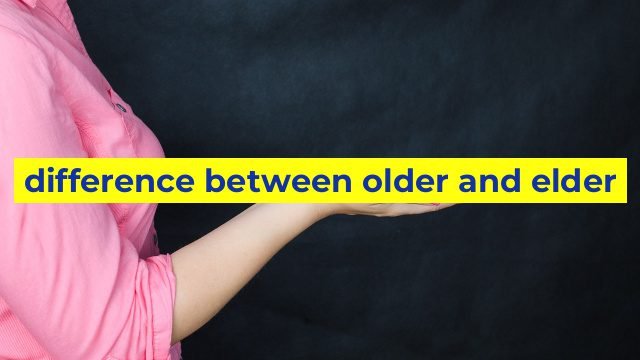The Difference Between Older and Elder: Which One to Use When
When writing, particularly in the English language, it’s essential to use the appropriate words for the context. The words “older” and “elder” are often used interchangeably, but they have a significant difference in meaning. Here’s what you need to know:
Definition of Older
“Older” is an adjective that means something or someone is advanced in age or years. It refers to the comparative age between two or more people, animals, or things. For example, you can say, “Mary is older than her sister, Jane” or “My car is older than yours.”
Definition of Elder
On the other hand, “elder” refers to the position or rank of someone in a group, particularly a family or community. It’s generally used as a noun or an adjective to refer to the oldest or most senior member of a group. For instance, “Grandmother is the eldest member of our family,” or “The elder members decided on this matter.”
How to Choose Between the Two
When trying to decide which word to use, ask yourself what you are referring to. If you’re talking about the seniority in a group, use “elder,” and if you’re talking about age, use “older.” Keep in mind that “elder” is used more frequently when referring to people as it has a more respectful connotation.
It’s also essential to keep in mind the difference between the two words’ grammar usage. Elder can be used as both an adjective and a noun, whereas older is only an adjective. For example, “The elder child is always more responsible” vs. “The older child is always the tallest.”
Conclusion
In conclusion, while “older” and “elder” may sound similar, they have distinctive meanings. “Older” refers to age, while “elder” refers to seniority in a group. Ensure that you use the right word to avoid confusing or misleading your readers.
Table difference between older and elder
| Older | Elder |
|---|---|
| Refers to a comparative form of old | Refers to a comparative form of elder (one who is older in age or seniority) |
| Can be used to compare two people or things in terms of age | Generally used to refer to a family member or someone in a position of authority who is older in age or seniority |
| Can be used for both living and non-living things | Usually used for living things only |
| Example: He is older than his brother by three years. | Example: My elder sister always gives me good advice. |

